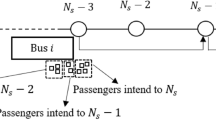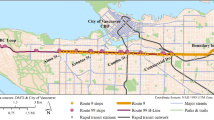Abstract
Long in-vehicle travel times resulting from frequent stops make bus service an unattractive choice for many commuters. Limited-stop bus services however have the advantage of shorter in-vehicle times experienced by passengers. In this work, we seek to modify a given bus service by optimally reassigning some number of bus trips, as opposed to providing additional trips, to operate a limited-stop service. We propose an optimization model to determine a limited-stop service route to be operated in parallel with the local service and its associated frequency to maximize total user welfare. A few theoretical properties of the model are established and used to develop a solution approach. As a proof of concept, we present numerical results obtained using real-world data together with comprehensive discussions of solution quality, computational times and the model’s sensitivity to different parameters. Finally, we solve the optimization model for 178 real-world bus routes with different characteristics in order to demonstrate the impacts of some key attributes on potential benefits of limited-stop services.











Similar content being viewed by others

Notes
Note that the term ‘frequency’ in this paper refers to the number of bus trips operated over a period under consideration of length T minutes.
References
Ceder A (1989) Optimal design of transit short-turn trips. Transp Res Rec 1221:8–22. http://trid.trb.org/view.aspx?id=308479
Ceder A (2007) Public transit planning and operation: theory, modelling and practice. Elsevier, Butterworth-Heinemann
Ceder A, Stern H (1981) Deficit function bus scheduling with deadheading trip insertions for fleet size reduction. Transp Sci 15(4):338–363. doi:10.1287/trsc.15.4.338. http://transci.journal.informs.org/cgi/content/abstract/15/4/338
Ceder A, Wilson N (1986) Bus network design. Transp Res, Part B, Methodol 20(4):331–344. doi:10.1016/0191-2615(86)90047-0
Desaulniers G, Hickman M (2007) Public transit. In: Barnhart C, Laporte G (eds) Transportation, handbooks in operations research and management science, vol 14. Elsevier, Amsterdam, pp 69–127. Chap. 2. doi:10.1016/S0927-0507(06)14002-5
Furth P (1985) Alternating deadheading in bus route operations. Transp Sci 19(1):13–28. doi:10.1287/trsc.19.1.13
Furth P (1986) Zonal route design for transit corridors. Transp Sci 20(1):1–12. doi:10.1287/trsc.20.1.1. http://transci.journal.informs.org/cgi/content/abstract/20/1/1
Furth P (1987) Short turning on transit routes. Transp Res Rec 1108:42–52. http://trid.trb.org/view.aspx?id=288816
Guihaire V, Hao J (2008) Transit network design and scheduling: a global review. Transp Res, Part A, Policy Pract 42(10):1251–1273. doi:10.1016/j.tra.2008.03.011
Jordan W, Turnquist M (1979) Zone scheduling of bus routes to improve service reliability. Transp Sci 13(3):242–268. doi:10.1287/trsc.13.3.242
Larrain H, Giesen R, Muñoz J (2010) Choosing the right express services for bus corridor with capacity restrictions. Trans Res Rec: J Trans Res Board 2197:63–70. doi:10.3141/2197-08
Leiva C, Muñoz J, Giesen R, Larrain H (2010) Design of limited-stop services for an urban bus corridor with capacity constraints. Transp Res, Part B, Methodol 44(10):1186–1201. doi:10.1016/j.trb.2010.01.003
Schwarcz S (2004) Service design for heavy demand corridors: limited-stop bus service. Master thesis, Massachusetts Institute of Technology
Scorcia H (2010) Design and evaluation of BRT and limited-stop services. Master thesis, Massachusetts Institute of Technology
Tétreault P, El-Geneidy A (2010) Estimating bus run times for new limited-stop service using archived AVL and APC data. Transp Res, Part A, Policy Pract 44(6):390–402. doi:10.1016/j.tra.2010.03.009
Transportation Research Board (2002) Estimating the benefits and costs of public transit projects: a guidebook for practitioners. TCRP Report 78
Transportation Research Board (2007) Bus rapid transit practitioner’s guide. TCRP report 118
Ulusoy Y, Chien S, Wei C (2010) Optimal all-stop, short-turn, and express transit services under heterogeneous demand. Trans Res Rec: J Trans Res Board 2197:8–18. doi:10.3141/2197-02
Acknowledgements
The authors thank Professor Nigel H.M. Wilson and the anonymous reviewers for their useful comments.
Author information
Authors and Affiliations
Corresponding author
Additional information
This research was supported by the National Research Foundation Singapore through the Singapore-MIT Alliance for Research and Technology’s Future Urban Mobility research program.
Rights and permissions
About this article
Cite this article
Chiraphadhanakul, V., Barnhart, C. Incremental bus service design: combining limited-stop and local bus services. Public Transp 5, 53–78 (2013). https://doi.org/10.1007/s12469-013-0067-7
Published:
Issue Date:
DOI: https://doi.org/10.1007/s12469-013-0067-7



